#so even if my master degree and my second bachelor degree is in cinema it was easier
Text
The results are here, one day late of course (thanks french administration you never disappoint) and I'm accepted. 198th for 598th accepted.
I'm a french teacher.
Goodbye unemployment after the PHD. I'm not a teacher in my speciality but that's all that matters.
#going to delete it later but#i need to say it to the whole world XD#between that and the PHD my stress is going so much better#i was so afraid#in France you can't believe you are going to have a place as a teacher in uni#so middle school and high school teacher is what you do#but it's annoying for people like me who have degrees etc in an other subject than what is proposed#fortunately i have two bachelor degrees and one is in french literature#so even if my master degree and my second bachelor degree is in cinema it was easier#BUT STILL#anyway I don't understand why they don't do a CAV CAPES#there is a music one so??? time to update
5 notes
·
View notes
Photo
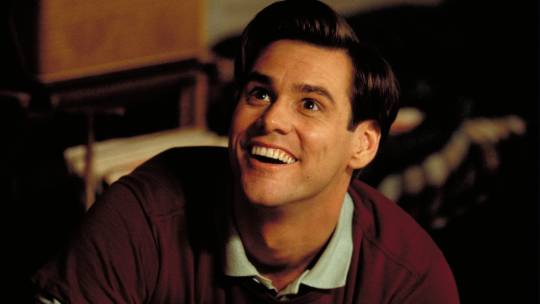
In Focus: The Truman Show.
Inspired by Letterboxd data that revealed it to be a lockdown favorite, editor-at-large Dominic Corry looks at the ever-evolving importance of contemporary masterpiece The Truman Show.
It has long been apparent that The Truman Show is an unnervingly prescient film. The story of a man who becomes aware that his superficially idyllic life is, in fact, a live-streamed television show has gone from being high-concept to every-day.
Thanks to the three Ps—the prevalence of mass urban surveillance, the proliferation of reality television and the pervasiveness of video in social media—the notion of cameras filming our every move is no longer a paranoid fantasy, but real life. The twist being that, for the most part, we all willingly signed up for it, and did all the filming ourselves. As Yi Jian saliently observes in his review: “Not to get all ‘we live in a society’ on Letterboxd but I know a person or two in real life that would actually give anything to trade lives with Truman, it do be like that sometimes”. It indeed do, Yi Jian.
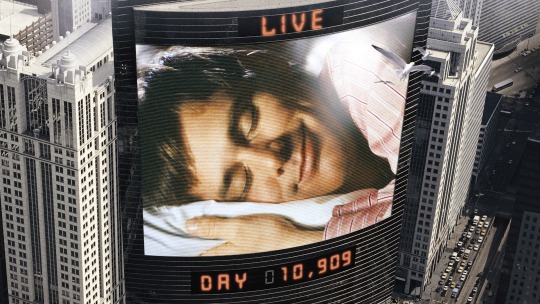
So it’s something of a cliché at this stage to point out how we are all living in some version of the The Truman Show, and you don’t have to be a member of the royal family to feel that way. Yet, somehow, the film has become even more pertinent over the last eighteen months. And it’s a pertinence reflected in the massive uptick in viewership for the film as seen in Letterboxd activity.
During the month of February 2020, the last moment of the Before Times, The Truman Show had a modest 1,235 diary entries. That number tripled in April of that year, by which time the seriousness of the pandemic had become clear. And by July, deep in the worst of the pandemic, Truman fervor peaked, with a further 178 percent leap over April’s numbers, firmly placing it in the top 200 films watched by our members in a year of lockdown. (By the way, ‘diary entries’ mean activity where the member has added a watched date; many thousands more also marked Truman as ‘watched’ in those dark months, but didn’t specify a date.)
It’s not difficult to imagine why we might become more interested in revisiting this eminently re-visitable film. During lockdown, social media—including Letterboxd—took on a greater presence in terms of how we communicated with each other. We got used to seeing footage of faces more than actual faces. We were all the stars of our own ‘Truman Show’, and simultaneously the audience of everyone else’s ‘Truman Show’.
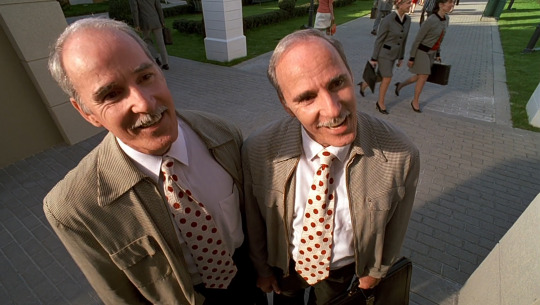
Christian Torres boiled it down effectively when he wrote: “Now every movie I see seems to be related to my life in quarantine. I am Truman and I want to escape.” And Sonya Sandra eloquently captured the film’s increased contemporary significance in her review: “This is a real-life daylight horror film. The best kind. Even more relevant in 2021 than ever. We are all Truman, we all want to find what is real in our fake lives filled with media, capitalism and ideology. And it’s our job to fight the storm and get to the truth of it all. Nothing is real, everything is for profit, and everyone is selfish. Go out and find what is real, because it’s definitely not here.”
With its deft, dazzling blending of the profound and the humorous, the optimistic and the cynical, it’s difficult to think of anything released since The Truman Show that comes as close as it does to being a modern-day Frank Capra movie. It’s hopeful, but has its eyes wide open. There’s a darkness in the themes of the film that is never replicated in the colors on display.
While everyone involved delivers career-best work, we must principally credit the triumvirate of talent at the center of the film: director Peter Weir, screenwriter Andrew Niccol and star Jim Carrey.
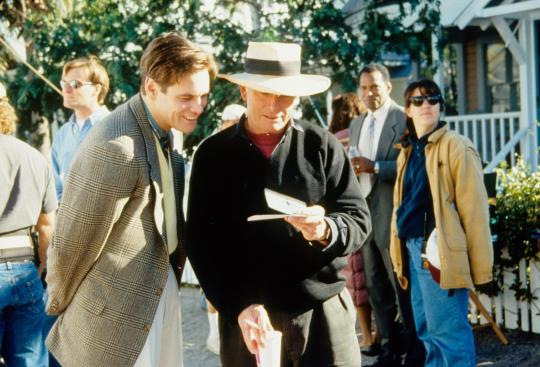
Star Jim Carrey and director Peter Weir on the set of ‘The Truman Show’ (1998).
Weir is a director who inspires much online love whenever his name is mentioned, but he isn’t really mentioned all that often. Or at least as often as he should be. The Australian filmmaker has delivered masterpieces across multiple genres, and it’s extremely sad that he hasn’t directed a movie since 2010’s not-quite-true World War II drama The Way Back, arguably one of his lesser works. That’s also, insanely, one of only two movies he’s made since Truman, the other being Master and Commander: The Far Side of the World, the wide and rabid affection for which regularly kicks up on Twitter (not to mention demand for a sequel).
Weir doesn’t do many interviews, and while this 2018 Vanity Fair article marking Truman’s twentieth anniversary has many quotes about the film’s modern relevance, Weir doesn’t offer any commentary to that effect, presumably preferring to let the work speak for itself—though in this 1998 interview he did talk about the relationship between the media, the general public and the people we become fascinated with, as a “complex situation”.
The Vanity Fair article does, however, reveal a fascinating ‘what if’ scenario relating to Christof, the god-like director of the in-movie TV show played by Ed Harris, who offers up a pile of pretentious auteur clichés: mononymous, beret, etc. (beyond the whole god thing, that is). When Dennis Hopper, originally cast in the role, wasn’t working out, Weir considered playing the role himself, which would’ve added yet another meta layer. It brings to mind how George Miller styled Immortan Joe (played by Hugh Keays-Byrne) after himself in Mad Max: Fury Road, or how Christopher Nolan’s haircut shows up in most of his films.

Ed Harris as Christof in ‘The Truman Show’ (1998).
And, at one point, it could have gone mega-meta. Weir, in the 1998 interview, talked about a “crazy idea” he had, a technical impossibility back then but easily achievable with live-streaming now. “I would have loved to have had a video camera installed in every theater the film was to be seen [in]. At one point, the projectionist would … cut to the viewers in the cinema and then back to the movie. But I thought it was best to leave that idea untested.” Imagine.
Weir also played a role in helping to shape the originally much more overtly dark screenplay into the cheerier (on the surface at least) shooting script, which is solely credited to fellow antipodean, New Zealand-born Niccol, also a producer on the film. Both men have done the majority of their work in America, but it’s tempting to credit the film’s tone-perfect sense of heightened Americana to the degree of separation offered by their foreign provenance. In any case, it’s clear that open-air mall designers were paying attention.
Niccol’s original screenplay made his name in Hollywood, and revealed a storyteller excited by big ideas. He moved into directing with the smaller-scale Gattaca, released a year prior to Truman (itself delayed to meet Carrey’s availability). Niccol’s subsequent filmography includes several legit bangers (Lord of War hive step up!), and his endearing dedication to lofty allegories in a genre setting makes him an increasingly rare breed in Hollywood.
Like Weir, he is not the greatest fan of giving interviews, but the Vanity Fair piece quotes him making an interesting point: “When you know there is a camera, there is no reality,” thereby making Truman “the only genuine reality star.”
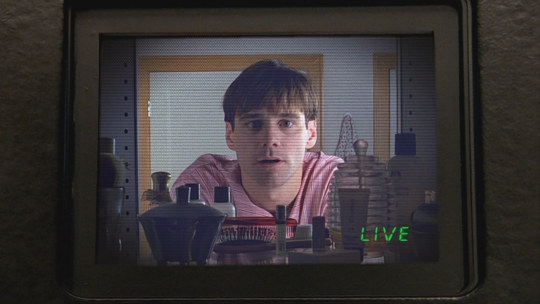
It’s a sentiment echoed by MusicMoviesMe, who writes that “‘Truman Show’ beats all other reality shows out there like Bachelors, Survivors and Kardashians. Come on, when you know there’s a camera at your tail, there’s no reality. So yes, Truman beats all reality shows out there bar none!”
The role was perfectly suited to Jim Carrey’s affected mannerisms, and his status as one of the world’s biggest stars meant he could relate to Truman more than most people. Then, at least. Nowadays, of course, we are all Truman.
“It is always incredible to see how far The Truman Show was ahead of [its] time,” observes The Closer79. “In a world where celebs are monitored 24/7 and we are showered with unnecessary private information on the web, where talent-free wannabes become famous and where you sometimes [wonder] what kind of surreal show society you are in—Truman and his fake show life cleverly have anticipated all of this. Only Truman knew nothing of his luck and he was granted an escape from his glass prison. We don’t really have this possibility… Aren’t we all Truman? Sometimes even voluntarily…”
Austin Burke concurs: “I have always known that I really enjoyed this film, but I had no clue that it would hold up so well years later… Could this be because the strange world that he finds himself in is far more similar to our world today? Possibly, but the idea and themes are so much more relevant now compared to when this originally released.” And while DallasFrance is conscious of piling on about the film’s prescience, his review highlights how there really is no limit to the film’s meta qualities:
“Instead of writing a review about how this film predicted social media, or how we’re all Truman, or yadda yadda yadda, I’ll instead fixate on the miraculous fact that two absolute legends were cast as primary viewers of the Truman Show:
1. The old lady from The Running Man who starts betting on Ben Richards (Arnold Schwarzenegger). ‘He’s one bad motherf*cker!’
2. The villain from The Karate Kid Part II:
‘Live or die, man?!’
‘Die!’
‘Wrong!’ *hooooonnnkkk*
I’ve never seen either of these actors in any other roles. With the second one, I felt like I was watching a character from my childhood watch a character from his childhood come to realizations about the characters in his childhood. So actually… the movie’s really about me.”
Never change, LB membership.
We are all generally pretty aware of how ahead of its time The Truman Show was, but that doesn’t lessen its impact. Maddie’s review shows that there’s always some new angle to consider: “Imagine being an extra in this movie… You would be an extra, playing an actor, playing an extra. Think about that long enough and tell me that doesn’t make you want to walk into the ocean.”
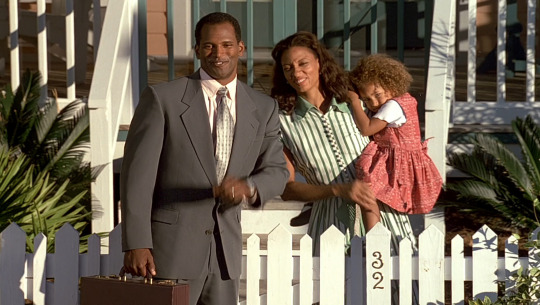
Kev goes even further: “Watching other people watch somebody else while also watching that person while also watching the person watching over that person is a great reminder that watching is weird, and to be watched is to not own yourself. Don’t watch, don’t try to be watched. Just live.”
Or perhaps Will encapsulates the film’s ability to present an ever-evolving message best, writing that, “clearly, this is video proof that we live in a simulation.” Beyond mere prescience, The Truman Show is a telling mirror to whatever era it is viewed in. Its message will continue to evolve.
Now that we’re finally (touch wood) emerging from the pandemic, it will be fascinating to see what The Truman Show has to say about its audience and the world they live in, in years to come. Rest assured, it will be well-documented by you, the Letterboxd audience.
Also: can Peter Weir please make another movie? Like, seriously.
Related content
A Meta-Reality: Robert’s list of layers of film in life and life in film
Follow Dom on Letterboxd
#the truman show#truman#peter weir#jim carrey#andrew niccol#letterboxd#lockdown#quarantine#coronavirus#pandemic#movies#comfort films#comedy#truman show
40 notes
·
View notes
Note
Well, since you broke down how absolutely *insane* the Hale House is (aka nothing matches). I now wish you would write a fic where we find out that the architect for (most of) the old BH houses was an anchestor of Finstock. Only a Finstock would be brave/crazy enough to build those houses. Bobby is probably the black sheep, he got into teaching/sport.
Stiles had never been to the art history classroom—or at least he was guessing it was an art history classroom, based on the posters of Starry Night and...some Renaissance looking stuff. Leonardo, Raphael—the ninja turtle gang. He didn’t actually know or care, he was much more preoccupied with not dying a horrible and painful death these days.
It felt wrong being in that room, and the only reason he knew he was in the right place was Scott sitting in his usual third row seat. But as he looked closer at the other desks, he realized the rest of the class was packed with lacrosse players and track team members, no doubt hoping for an easy A.
This should be interesting.
Stiles took the empty seat saved next to Scott and leaned over to whisper, “Dude, why the hell did you want to take this class again?”
It was Stiles’ sixth time asking this question, but Scott came up with a different answer every time, and he wanted to see what it would be today. What possible reason he could have for wanting to take Architecture 101 instead of, say, the super easy guitar class or pilates. Or maybe something more relevant to their lives, like mythology, or hell, cosmetology.
They were going to different colleges next year so they agreed to take an elective together, one last class, but of all the senior electives offered at Beacon Hills High School, the massive list of blow-off classes available, History of Cinema included—an architecture class.
Taught by Coach Finstock.
“Because it’s not Russian lit,” Scott shrugged, and flipped open a new notebook, with Arch 101 written on the cover in sharpie. “I've got enough reading to do with AP English.”
That was fair, Stiles allowed, but he was just petty enough to not mention the fact that people wrote entire treatises on architecture. He knew that much about the subject. There was going to be plenty of reading for this class, but Scott could figure that out for himself.
He threw one last look around at the other students, half of whom didn’t even have notebooks, and flipped open his own—not a new one, just the next free page of last semester’s English notebook. He wasn't expecting to stay in this class for long.
As if to prove his point, Finstock burst in exactly six minutes late, with no supplies aside from his usual #1 Coach mug.
He put his mug on the desk, yanked down the projector screen, and smacked the overhead lights off.
“Architecture,” he started aggressively, and stabbed the remote towards the projector at the back of the room. The word appeared on the screen with nothing else.
“You might be wondering how old Coach is qualified to teach this class.” He chuckled to himself. “How am I not qualified? Seriously, it's buildings. We spend every day of our lives in them, who couldn't teach this class?”
He said it with such disdain that Stiles had to glance around the room to look for reaction cues. Everyone seemed to be somewhere between amused and wondering if Coach was having some kind of mid...ish life crisis. A couple people half-smiled, but most pretended to be riveted by that single white text on black Architecture slide.
Coach didn't care and didn't wait long before continuing on his spiel.
“But because this school allegedly requires some kind of proof to teach this class, I did my bachelors in architecture, right before I pulled my head out of my ass and got a master's in economics.” He glared around the room. “Why did I waste my money on a useless architecture degree?” A chuckle. “Well first, college was way cheaper in the eighties—economics. And second, my grandfather designed this school.” He flipped to a slide of the building, taken at a crooked angle with an old camera phone.
“My father designed the post office. My brother put up that god awful highrise downtown.” His lip curled up in a brief snarl like the very thought of it disgusted him.
Stiles had to agree; Derek's loft at the top of it was a safety inspector’s worst nightmare.
“My entire family is made up of architects. We built this town, as you can see from this list.”
The next slide was, indeed, three columns listing key buildings and addresses all over town, from the Sheriff's Station to...
“Is that the Hale house?” Stiles asked before he thought better of it, recognizing an address halfway down the third column.
“We don't talk about the Hale house,” Finstock immediately snapped. “My great great grandfather was a nutjob and 80% blind. He couldn't design a second empire style house to save his life, and this one didn't.” Slight pause for effect, staring down the room. “He died of tertiary syphilis two years later.”
A couple people shifted awkwardly, but Finstock continued.
“It's a stain on both our family history and the entire history of architecture as a discipline. We don't talk about it.” He glared around the room, daring anyone to continue. “Any questions?”
Dead silence, then Greenberg in the front row slowly raised his hand. Coach rolled his eyes, but nodded towards him.
“Why aren't you an architect, Coach?”
Finstock looked at him for a long five seconds of unblinking silence before responding:
“Because any contractor with a computer program can throw together a McMansion in ten minutes with as many gables and columns as they can possibly cram in there, and they're not going to pay an actual architect to tell them they shouldn't.” He shrugged, in that agitated are you kidding me with this kind of way, and turned to the rest of the class. “Any questions that aren't totally idiotic?”
Silence.
“Great.” He clicked to the next slide. “The Parthenon—get ready to hate the British.”
357 notes
·
View notes
Text
Garrett’s Take On Love (And Other Things)
Chapter One
Garrett, for one, had no idea that this would happen. He had never even had an inkling that he might not be straight. At least not until he had run into an old classmate, Cal Price. It wasn’t as if Garrett had never seen him before, in fact, they had run into each other many times throughout high school, they just hadn’t talked. But earlier, at the Waffle House, they had talked. And for the first time, Garrett realized that he might like guys. As well as girls, but that didn’t make the whole Morgan complication any better.
It had started out as a normal day spent back at home. He had back in Creekwood for a couple weeks now, but Greenfeld and Spier had just flown in over the weekend. Greenfeld and he had planned to meet at the Waffle House, sans boyfriend, despite Greenfeld’s protests. Of course, Garrett’s persistence against bringing Spier along was exactly what had Bram running late. And then, in walked Cal Price.
Garrett was bored, to say the least, and he did not like being bored, not one bit. So, he stood up, thinking, ‘Hey, Price probably remembers me,’ and called out, “Hey, Price! Is that you?” And Cal had turned and smiled, and Garrett’s knees had practically buckled beneath him, because, holy shit, that smile was breathtaking. Garrett stumbled a bit before he smiled back, asking, “Want to join me?”
Garrett led Cal back to his booth, and they sat across from each other, and Cal smiled that brilliant smile again, asking, “So, what have you been up to at Georgia Tech?”
Right as Garrett was about to answer, the waitress came to the table, probably thinking that Garrett was finally ready to order, now that Cal was here. He had told her his predicament not fifteen minutes earlier, and she had gracefully let him wait. Not wanting to seem rude, he orders, “I’ll have scattered, smothered, and covered waffles with sausage and hash browns, and orange juice. Thank you.” He grimaces slightly because Morgan always tells him that he eats too much, and he doesn’t want Cal thinking that as well but covers it up with a smile quickly. Cal orders cheese and eggs, raisin toast with apple butter, and black coffee. He doesn’t make a note about how much Garrett eats. It’s refreshing.
It takes a pointed look from Cal for Garrett to realize that he still has a question to answer. He takes a deep breath, and replies, “So, at the moment, I am getting my bachelors in Music Technology, playing on an intramural soccer team, and in this student piano organization called PianoForte. Plus, I help out with the Pride Alliance, PAUSE, and the LGBTQIA Research Center.” Cal seems shocked, and Garrett tries to cover up the blush spreading across his face by asking, “So, Price, where did you end up going?”
“How do I know where you go, but you not know where I ended up going?”, Cal laughs. Garrett rolls his eyes, and makes a hand motion for Cal to just get on with it, but also laughs, that way he doesn’t seem rude. He hates coming off as rude. Cal continues, “I got to the Savannah College of Art and Design. I’m getting my bachelors degree in Production Design, and I’m planning to get my masters in Cinema Studies there as well. I’m in SCAD Queers and Allies, Scripted, and Drawing Inc.”
“So, we have similar interests,” Garrett said, and then immediately wished that he hadn’t, because it sounded a tad bit desperate. Especially for someone who is supposedly straight, and talking to someone of the same sex. Garrett stumbled over his next words, which were, “I mean, we’re just going for similar degrees, and we’re both involved in LGBTQIA+ stuff, and -”
His words were stifled by laughter, which Cal wasn’t even trying to hide. Garrett glared, but Cal refused to stop laughing until a few minutes later, after which he said, “Garrett, calm down. I don’t mind having a lot in common with you. In fact, I wouldn’t mind finding out more things we might have in common.”
Cal had said it in such a flirty tone that Garrett could not help but blush, which was why he was so glad when the waitress set down their food. He smiled at the waitress, a pretty blonde named April, and almost wished it was her he was thinking about rather than the boy across from him. He pushed both thoughts out of his head, reminding himself that he was in fact, dating Morgan. Smart, nice-looking, sometimes-insensitive-but-overall-nice Morgan. Garrett shook his head furiously, at least on the inside; he seriously needed to stop thinking.
To keep Cal from flirting (?) with him again, Garrett asked, “So, last I heard, you were with Spier’s sister, right?” He was sure they had gone to prom together, was sure that he had seen them together a lot in the months before as well. What he wasn’t sure about was whether they were still together or not.
“Well, maybe that’s the last you heard, but Nora and I were always a casual deal. Sure, I liked her, and she liked me, and we took advantage of the time we had; but in the end, we both knew that we would split when I headed off to college. We both wanted to put our all into the lives we had, not the lives we could have and didn’t want to bother with shaping our lives around each other,” Cal replied, in between bites of food. He took a sip of his coffee after he finished talking, but his eyes never left Garrett’s.
Garrett countered this with his own relationship, “Well, Morgan and I got together during the summer after graduation, with us both staying in Georgia and all. And, well, I can’t say it’s a great relationship, but it’s comfortable. You know, mostly.”
“Actually, I don’t know. Every relationship that I’ve been in where I haven’t been happy, I’ve just ended. I guess comfortable just isn’t enough for me. I also think that you both being in Georgia isn’t really a reason to be together. I mean Nora and I are both in Georgia, hell, she just graduated, and she got into my school, but I don’t plan on getting with her anytime in the foreseeable future,” Cal answered, now looking worried. After a moment, he continued, “So, why can’t you call it a great relationship?”
“I mean, I don’t know if you heard about the drama our senior year involving her and Abby and Leah, but basically she made this insensitive comment about Abby only getting into UGA because she’s black, and – ,” he saw a look on Cal’s face that showed a mix of disgust and horror, “- don’t worry, she apologized repeatedly, and promised it was a one-time slip, but then-,” he stopped.
“But then it wasn’t?”, Cal asked. Garrett nodded, which led to Cal saying, “First of all, I know all about that drama. Other than her obsession with Nick, that’s all I heard from Taylor all senior year. Could be the reason that we haven’t talked since that summer. Second of all, may I ask what she’s said? Like, how insensitive does it get?”
“Well, the worst one was when she found out that my roommate was an excommunicated Mormon, and gay. She made so many shitty jokes about his religion and even more about him taking advantage of me. They haven’t talked since. But a close second was when her friend Anna came out as asexual, and she said something about how she was so tired of everybody feeling the need to label themselves, and ‘Wasn’t anybody just straight anymore?’. But she would always apologize after, and well, yeah,” Garrett said, as he slowly realized how shitty all of this sounded. How none of Morgan’s apologies felt worthy of the things she had said. And how horrified Cal looked.
Cal sighed, closing his eyes in what looked like a mix of pity and unbelieve, and said slowly, “Look. I know you didn’t ask for advice. But I’m going to give it to you anyways. Hearing what I’ve heard about Morgan, I feel like you need to either talk to her about how shitty the things she says are, or… break up with her. And whatever you decide, even if you choose to not take my advice, I’m here to talk. And I will always tell you that you, Garrett Laughlin, deserve a girl who is just as amazing as you are, if not better. If that’s possible.”
Maybe not a girl, Garrett thought.
They sat there in silence for a few minutes as Cal finished eating, which was conveniently just as Greenfeld was walking in. The two other boys exchanged smiles, and Greenfeld took the spot that Cal had just been occupying. April took the other boy’s order quickly, refilling Garrett’s orange juice as she did, but as she left, Greenfeld smirked in a way that made Garrett cringe.
“So, what happened to the no-boyfriends-whatsoever rule, hmm?”, Greenfeld asked.
0 notes
Text
Sensor Sweep: Kyrik, Earl Norem, Stormbringer RPG, Denny O’Neill
T.V. (RMWC Reviews): In 1973, Tsuburaya Productions released several shows as part of the company’s 10th anniversary. The first one to see release was Fireman (or Magma Man in some markets), which began airing on Nippon Television on January 7, 1973, running until July for 30 episodes.
Warfare (Aeoli Pera): The typical special forces trainee who passes selection has a higher rank (officers were far more likely to pass than enlisted), at least a bachelor’s degree, high general personality factor with extremely high conscientiousness, no children, and verbally tilted IQs averaging in the 120s. This study looks at Ranger school but it’s true across all special operations services in the Western world. Please note that, except for measuring the ability to do pullups, these exact predictors could be used to select head girls for graduate departments in the humanities and social sciences.
Fiction (Wasteland & Sky): Interested in superheroes? If you’re reading this post then there’s a good chance you do! But how much? Check out this new bundle of hero books compiled by immortal SF author Kevin J. Anderson. The offer is for a limited time, so don’t miss out! The description for the bundle is as follows: The Up, Up and Away Superheroes Bundle – Curated by Kevin J. Anderson: If reading is your kryptonite, I’ve put together a superpowered StoryBundle—thirteen books with marvelous heroes, supervillains, secret identities, mutant powers, and extraordinary gentlemen (and ladies).
Popular Culture (Legends of Men): Why do these guys virtue signal? They’re saying this type of thing to other readers of S&S and REH and the pulps. The entire readership obviously enjoys these genres with as much or as little diversity as they already have. Past works cannot be changed and what made them popular once is more likely to make them popular again than changing the nature of what they are. So do some readers feel the need to virtue signal to other readers?
Reading (DVS Press): How many times have you seen a movie and though, “Man, the book was so much better,” or had a friend who read the book say the same to you? I can definitely say that the cases where the movie is better than the book are far outweighed by the reverse – probably in the range of 20:1. In fact, the only writer whose work seems to function better on screen than on paper is Stephen King, and even then there are plenty of books in his exceptionally large canon that are much better than their cinema counterpart (anyone remember The Dark Tower? I hope not).
Science Fiction (John C. Wright): Sometimes in this life we see justice done. The Nebula Awards have just honored Gene Wolfe with a Grandmastership. The honor is overdue, and all lovers of literature should rejoice. Gene Wolfe is the Luis Borges of North America. He is the greatest living author writing in the English language today, and I do not confine that remark to genre authors. I mean he is better than any mainstream authors at their best, better in the very aspects of the craft in which they take most pride.
Culture War (Kairos): This is why they hate Japan. This the material manifestation for why they can’t handle the Beautiful and seek to degrade before they destroy; the humiliation is intended as much to assuage the abuser’s amygdala as it is to afflict the victim’s, a “No You, Christcuck!” retort as they rip the beautiful apart before finishing the job. The cruelty is part of the process by design. The shitlords–God bless you all–at /pol/ noticed that this applies to all of the cultural attacks.
Art (DMR Books): When Earl demobilized, he went into magazine illustration, mostly for the “Men’s Adventure” mags. Such magazines have also been called “men’s pulps” and “sweat mags”. Essentially, they were magazines that somewhat carried on from the actual pulps–which died out in the 1950s–but were printed on “slick” paper. A significant percentage of their readers were veterans of World War Two and Korea who were looking for manly stories featuring action and beautiful women.
Comic Books (Diversions of the Groovy Kind): As most of you know, Groove-ophiles, Denny O’Neil, one of the most influential writers of the Groovy Age passed away at the age of 81 on Friday, June 12. Much has been written about O’Neil during the past week, and that’s how it should be. During the 1970s, O’Neil changed the way we would think about Batman in particular and comics in general forever (in tandem, naturally, with artist Neal Adams, mostly, but also with a host of other artistic luminaries from Irv Novick to Mike Kaluta to Jack Kirby to Mike Grell).
Robert E. Howard (Don Herron): Something I didn’t know much about, was a bank robbery that had occurred in the little town of Cisco on December 23, 1927, over 80 years earlier. The so-called Santa Claus Bank Robbery was a story I had heard about, of course, but the Kris Kringle business had conjured up images of a gang comprised of members of Monty Python’s Flying Circus and the Bowery Boys. I couldn’t have been more wrong.
RPG (Black Gate): Chaosium’s Stormbringer! was a licensed product based on Michael Moorcock’s Elric of Melniboné secondary world fantasy series. The game engine used modified Basic Roleplaying mechanics; in particular, magic worked very differently in Stormbringer than in Runequest. Characters could come from a wide variety of backgrounds; power-gamers preferred certain back-grounds over others because there was no pretense of game balance between them.
Heinlein (Black Gate): It’s almost impossible to discuss Robert A. Heinlein’s The Pursuit of the Pankera: A Parallel Novel about Parallel Universes without revealing and thus spoiling the plot devices of it and its 1980 prequel/sequel, The Number of the Beast—. Heinlein, first Grand Master of the SFWA, for decades acclaimed as the Dean of sf, no longer pleases everyone. Some readers, especially academic critics, have denounced both books as grossly self-indulgent and even worthless. Others, like the brilliant Marxist professor H. Bruce Franklin (in his important 1980 study Robert A. Heinlein: America as Science Fiction) catch the feel of Beast: “a cotton-candy apocalypse — frothy, sweet, airy, mellow, light, festive, whimsical, insubstantial” (199).
Sword-and-Sorcery (Ken Lizzi): I’ve read a few of Gardner Fox’s Kothar books. So when I saw his name on the cover of Kyrik Fights the Demon World I didn’t hesitate to snatch up the book. No one will claim that Fox was a master stylist. Take this paragraph from page one of Demon World. And so Makonnon quested through spatial emptiness into lands that had known him, long and long ago. He sent his mind across unfathomable distances, seeking, hunting, searching for that which so infuriated him.
RPG (Cyborgs and Sorcerers): Vancian Freeform Magic. I know that sounds like a contradiction in terms. It isn’t. You’ll see. I love the idea of free-form spell systems because they allow for endless creativity, and for me, creative problem-solving is the biggest source of fun in RPGs. In practice though, people often come up with a few favorite spells they cast over and over. This system was designed to prevent that by continually varying the tools in the free-form spellcaster’s toolbox. It’s a noun-verb system like Ars Magicka, except the nouns and verbs are not skills you’re permanently trained in.
Tolkien (Tolkien and Fantasy): The details of Tolkien’s epistolary friendship with the US editor, writer and sculptor Sterling Lanier (1927-2007) are difficult to ascertain, and various accounts differ as to the chronology and extent of their correspondence. In 1973, Lanier wrote that “it began in 1951” and amounted to some “dozen or so letters we exchanged over the years.” In a 1974 fanzine profile of Lanier by Piers Anthony, it notes that Lanier had had “ten years of correspondence” with Tolkien. In 2016, a book dealer had for sale six letters from Tolkien to Lanier, plus one from Tolkien’s wife.
Science Fiction (M. Porcius): I enjoyed my recent look at the 1950 issue of Thrilling Wonder Stories with Leigh Brackett’s “The Dancing Girl of Ganymede” and Henry Kuttner’s “The Voice of the Lobster,” so, to take a break from my rereading of Fafhrd and the Gray Mouser, I propose spending some time reading more stories by Brackett and Kuttner from Thrilling Wonder (we might end up checking out some Thrilling Wonder contributions by Brackett’s husband, Edmond Hamilton, as well.)
RPG (Swords and Stitchery): I have used & abused B4 The Lost City adventure & its inhabitants for years now a venerable pulp module created by Tom Moldvay. “”The Lost City” (1982) was the first adventure written entirely for the second edition Dungeons & Dragons Basic Set (1981). No surprise, then, that it was written by the author of that set, Tom Moldvay. ” Today I’ve been thinking about specifically adapting this module as perhaps a starter to Astonishing Swordsmen & Sorcerers of Hyperborea second edition as an introductory module.
History (Outlook India): Tucked into Pakistan’s remote northwestern hills, along the border with Afghanistan, is a cluster of three villages whose residents are still trying to preserve their language and culture in the face of advancing modernity and religious conversion. The tribe, known as Kalash, is said to have descended from soldiers of the army of Alexander the Great who travelled this way in 324 BCE. However, many scholars deny the story even though it has not been established finally yet how these people, their language, dress, and their nature-worshipping culture—in marked contrast to the Islamic culture that surrounds them—evolved and survived through the centuries.
Fiction (Dark Worlds Quarterly): I used to use the words “Pulp-descended fiction” and it was the source of RAGE m a c h i n e Books. I wanted to capture that feeling that good Pulp writing gives you. What that really means is I grew up on authors who wrote during the Pulps and those who followed, they too influenced by those five decades of magazine publishing. The world has since moved on, with television and paperback novels, comic books (now called “graphic novels”). Despite this, Pulp remains with us. Not in the packaging but under the surface.
Sensor Sweep: Kyrik, Earl Norem, Stormbringer RPG, Denny O’Neill published first on https://sixchexus.weebly.com/
0 notes